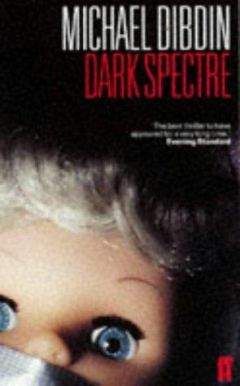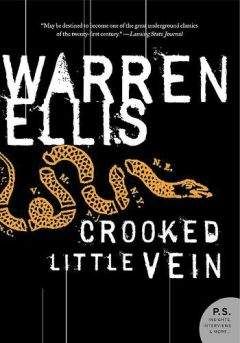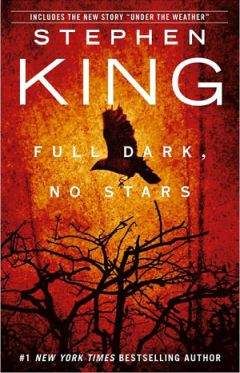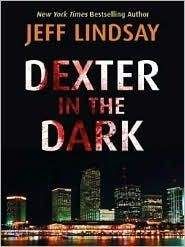Michael Dibdin - Dark Specter

Скачивание начинается... Если скачивание не началось автоматически, пожалуйста нажмите на эту ссылку.
Жалоба
Напишите нам, и мы в срочном порядке примем меры.
Описание книги "Dark Specter"
Описание и краткое содержание "Dark Specter" читать бесплатно онлайн.
Two factors weighed against this hypothesis. The first was that the spouses in question usually killed themselves at the same time, or gave themselves up to the police immediately afterward. The second emerged from the autopsy report on Mrs. Sullivan and the two boys, which revealed mild contusions and abrasions around the wrists and traces of adhesive on the lips and surrounding skin, suggesting that the victims had been bound and gagged before being shot. That, like the choice of weapon, seemed to indicate the work of a cold-blooded professional killer, not an emotionally wrought spouse, but no one had been able to come up with a convincing reason why such a killer should choose to execute a housewife, two schoolboys and a baby-unless of course it was a case of mistaken identity.
Police work is a percentage game, and at the moment the smart money was on the estranged husband.
If he hadn’t given himself up, Wayne Sullivan would have been a hard man to find. His driver’s license was still registered to the Renfrew Avenue address. He didn’t have a bank account or hold a regular job, and was staying at a semi-derelict house he shared with two other men in a forgotten patch of Renton blighted by the Burlington Northern tracks on one side and Highway 405 on the other.
Fortunately he made life easy for everyone by turning himself in just a few hours after the all-points bulletin went out.
Sullivan’s story was that he had spent the day painting an empty apartment in Bellevue, a subcontract he’d picked up from a friend in the construction business. It wasn’t much of an alibi, but Kristine Kjarstad didn’t get too excited about that. One look at Wayne, you knew this guy didn’t have a life, so why should he have an alibi? And while he did admit to having a gun, it turned out to be a.30-caliber Remington hunting rifle. He claimed that he had spent the day painting the Bellevue apartment and had heard of the killings on the radio as he was driving home. He was offered and accepted a polygraph test, which he passed. Tests for nitrates on his hands and face proved negative. His fingerprints had been found at the scene, but not on the bodies or clothing, and since he regularly visited the house, and had lived there until recently, this proved nothing.
There wasn’t enough evidence to hold Wayne Sullivan for the killings, but Kristine Kjarstad ran a computer scan which showed that there was a warrant out in his name for unpaid traffic fines amounting to $145. Sullivan couldn’t pony up, so he was taken across the street to spend the night in the King County jail. Meanwhile Kjarstad obtained a warrant and ordered a search of the house in Renton. This turned up a.22 automatic pistol belonging to one of the other residents, but it was loaded with a different type of ammunition from that used in the killings and showed no sign of having been recently fired. Moreover, the absence of spent cartridges at the scene meant that the perpetrator had either carefully collected them after shooting-in itself inconsistent with the domestic scenario-or had used a revolver instead of an automatic.
Then two things happened that changed the whole tenor of the case. The first was that the social worker looking after Jamie Sullivan contacted the police with the news that the boy had started to talk about what had happened. Kristine Kjarstad tried without success to get him to respond directly to her questions, but the foster mother reported that Jamie had told her that he had been concealed behind a service hatch in the furnace housing as part of a game of hide-and-seek with the other two boys. While there, he had heard strange voices in the house. One had said something about “a piece of wood,” presumably referring to the panel covering Jamie’s hiding place, which had fallen off. The other man had used the name “Russ.”
If this was true, it explained why Jamie had survived the slaughter. However, its real significance lay in the fact that it suggested that there had been at least two killers, neither of them known to Jamie. Unfortunately its value was diminished by the source. Jamie Sullivan had had plenty of time to think the situation through and decide what story to tell. The part about hiding in the furnace hatch might well be true, but suppose the person he had seen from his refuge had not been a stranger. That would explain his shock, his initial refusal to speak, and the elaborate and unlikely tale he had finally come up with, as well as his continuing reluctance to expose himself to cross-examination by the police. The cover story must be as different from the truth as possible: two men, not one, and safely anonymous strangers, not the all-too-familiar figure of his own father.
But even as Kristine Kjarstad was digesting the implications of Jamie’s reported statement, a second development promptly superseded it. One of the two men Sullivan had been sharing the house in Renton with appeared at the courthouse and paid the fines outstanding in Wayne’s name. Since they still lacked sufficient evidence to press murder charges, the police had no choice but to release Sullivan. When he was informed of this, however, the prisoner refused to be released and demanded to speak to Kristine Kjarstad.
Fearing some kind of protest against his unjust detention, Kristine asked Steve Warren to sit in on the interview. Sullivan was tall and rangy, with a sad, defeated face framed by a bushy brown beard. His piercing green eyes looked restlessly around the room as though on the alert for insult or aggression. He sat down opposite the two detectives and asked for a cigarette.
“This is a no-smoking facility,” Warren told him sternly.
“But you can smoke all you want outside,” added Kristine Kjarstad.
Wayne Sullivan looked at her, shaking his head slowly. Tears trickled from his eyes and fell, getting tangled up in the mesh of his beard like dew in a spiderweb.
“Can’t do that,” he mumbled.
“That buddy of yours paid your fine,” said Kjarstad. “You’re free to go.”
The movements of Sullivan’s head became ever faster and convulsive.
“I don’t care about the fine!” he said. “It’s the babies I care about.”
His tone was so pathetic that Kristine Kjarstad had to look away. Dead bodies didn’t bother her, precisely because they were dead. The grief and suffering of the living was much more difficult to deal with.
“We’re doing everything we can,” she said in a kindly tone, forgetting for a moment that Sullivan himself was the principal suspect, in fact the only one. “I’m sure we’ll find out pretty soon who did it.”
Wayne Sullivan looked up at her in astonishment.
“Find out?” he exclaimed. “What the hell’s to find out? I did it! That’s what I came to tell you. I didn’t want to do it, but there was no other way to save them from that bitch.”
4
I never expected to see any of them again, and when I did it was pure coincidence. I was passing through O’Hare on the way back from Boston, having visited my parents on the occasion of my father’s sixtieth birthday. He had recently retired, and they had moved to a house on Cape Cod. Because of my mother’s poor health they had been forced to cancel a planned trip to come to see us, and since Rachael hadn’t wanted to travel so far with David, I ended up going there alone. On the way back my connection in Chicago was delayed, and I was killing time in the bar when someone walked up to me and said, “Phil?”
The face looked vaguely familiar, but it was only when the man noticed my blank expression and said his own name that I realized who it was. Recognition came tainted with a sense of unease. Of the whole group, Vince was the one I had been least close to. His interests-sex, drugs and rock-and-roll-were also ours, but the single-mindedness with which he pursued them set him apart. To Vince, time not spent balling, tripping or bopping, preferably all at once, was time wasted. We admired his purity, but even then it seemed a little extreme. I had never forgotten the time I’d unguardedly mentioned some novel I was currently enthusiastic about, and Vince had remarked crushingly, “You still read books? I’m too busy living.” After that I’d never quite known what to say to him. What on earth would we have to say now?
It immediately became clear that Vince was no longer Vince. The former acidhead, sack artist and lead guitar manque was now a highly paid sound technician for a TV station in Chicago with a profitable sideline in freelance assignments. He looked fit, tanned and relaxed, and sipped a Perrier while I slurped my scotch. The duds he had on looked like they cost more than my car, and instead of a commuter plane to St. Paul he was catching a direct flight to Tokyo, club class, to film a documentary on sumo wrestling.
Worst of all, he was nice about it. He made no attempt to cold-cock me with a blow-by-blow account of his glamorous lifestyle, and even showed some polite interest when I filled him in on the banal data of my own. I told him that I was teaching English at a community college, that I was married, that we had a child. What more could I say? That I liked my work? That I loved my son to distraction? That I was happier than I had ever been in my life? It would have sounded false and forced. I let the lame facts speak for themselves with no attempt to explain or excuse. Vince was very kind and correct.
“Boy or girl?” he asked.
“A boy. David.”
“How old is he?”
“Going on seven.”
“Great. I’d love to have kids one day. Right now, though, a family life’s kind of impossible.”
He even managed to sound slightly envious! I started to warm to him.
Having exhausted every other topic we had in common, we began to talk about the others. Vince had lost touch with Greg, who had last been heard of working on the Alaska pipeline, but he had news of Sam and Larry. It was bizarre and a little disturbing.
“When they got drafted, we all figured Sam would get some cushy desk job while Larry ended up as a grunt, right? Wrong! The army found out that Larry had worked as a painter, and he got to stay right here fixing up the mess and recreational facilities at the base. Never even went to Vietnam.”
I laughed.
“Good for him.”
Vince shook his head.
“Two days before he was due to go home, he got hit by a truck. Some guy had been drinking, came around the corner with no lights on, didn’t even see him. Larry didn’t stand a chance.”
I was shocked. I’d read about the war, of course, and seen the familiar, horrific pictures on TV, but it had all seemed as remote from my own existence as gangland killings in Miami or race riots in Los Angeles. But Larry was someone I’d known. He’d painted our house in his spare time, using up leftovers from whatever job he happened to be working on. The results were quite spectacular: strips and patches of every hue, shade and finish, some matt, others shimmering satin, a few in high gloss. I’d joked and smoked with Larry, eaten and drunk with him. Once in a while we even talked. I suddenly remembered that last time, down at the Commercial Hotel, when he’d clashed with Sam over the existence of God.
As so often in the past, when the joint had passed and the vibes were good, Vince must have been having the same thought.
“Well, I guess Larry knows the answer to all the big questions now,” he said. “Shame he can’t come back and have the last word.”
“Sam made it OK, then?” I asked, glad to change the subject.
“Uh huh. Which is almost as weird as Larry getting killed.”
“How do you mean?”
Vince looked at me.
“You remember how the system worked? After induction you did two months basic training, and then you got to find out what classification they’d assigned you. The one no one wanted was Eleven Bravo. That meant you did two more months training as a rifleman, then got shipped to Nam to replace the guys who were coming home in body bags. But there were eight support personnel for every man at the front, so if you had any kind of qualifications or education your chances of avoiding combat were pretty good.”
“Like Sam,” I prompted.
“Yeah. Except Sam volunteered.”
“Volunteered?”
Vince nodded.
“Doesn’t make sense, right? Anyone that crazy to see action had already joined up, and they’d mostly all been in ROTC at college and were into all that military bullshit. But for someone to wait to get drafted and then deliberately lay his life on the line when he could walk away with a job as a filing clerk! And a guy like Sam!”
I shook my head.
“I don’t get it.”
“Me neither. But that’s what he did, and he spent his whole tour of duty under fire. The company he was in took eighty percent casualties in one firefight. He was out there the full year, and he came back without a scratch on him.”
“You met him, then?”
“He wrote me. We talked about getting together, but nothing ever came of it.”
We chatted some more about this and that, and then my flight was called. Vince and I hurriedly exchanged addresses, phone numbers and formulaic promises to keep in touch. By the time my plane was airborne, the whole encounter seemed unreal. I didn’t bother to mention it to Rachael when I got home.
It must have been almost a year after that when Sam called me at home one evening. It was not a good moment. David had recently developed chronic asthma, and although the medication normally kept the symptoms in check, he was still liable to have periodic crises. This was one. He had caught a heavy cold the week before, and this had precipitated an asthma attack which kept him-and us-awake for hours every night while he coughed and cried and struggled for breath.
As a result, Rachael and I were both ragged from lack of sleep, and oppressed not just with a rational anxiety for our son’s health but with something neither of us could mention, even to each other-a sense of failure, of inadequacy, of what I might once have called “bad karma.” However much you reject the idea rationally, a child becomes a symbol of the relationship which brought it into being. Any congenital weakness in the former inevitably reflects on the latter.
As well as nursing David, Rachael and I had our jobs to deal with. Her work for the Children’s Protective Service continually brought her into contact with stressful situations involving, as she once said, people who shouldn’t be allowed to keep a cat, never mind a child. There was no solution to the problems she dealt with, only damage control and the least harmful option. Sometimes, as that evening, this knowledge left her feeling depressed and vulnerable.
When the phone rang, she was telling me about the case she was currently working on, a ghastly affair involving systematic physical abuse over a period of years. Just hearing about it brought me down-I was exhausted myself, and had my own, less dramatic problems at work-but I knew that sharing these horrors with me was therapeutic for her, and forced myself to listen. David was running around screaming his head off in a desperate attempt to attract our attention. Before us loomed another sleepless night.
Подписывайтесь на наши страницы в социальных сетях.
Будьте в курсе последних книжных новинок, комментируйте, обсуждайте. Мы ждём Вас!
Похожие книги на "Dark Specter"
Книги похожие на "Dark Specter" читать онлайн или скачать бесплатно полные версии.
Мы рекомендуем Вам зарегистрироваться либо войти на сайт под своим именем.
Отзывы о "Michael Dibdin - Dark Specter"
Отзывы читателей о книге "Dark Specter", комментарии и мнения людей о произведении.







